
Map of eastern China, with names from the 1930s.
Father came to
Hong Kong and was placed in Linhsien in the north. Then he traveled south —
over on the west side of the Yellow River to meet mother in Hankow.
There was the wedding in June 1938. The honeymoon was a arduous one
trip back to Linhsien.
In 1940, the family went to the coastal city of Tientsin, where AnWei was born.
After returning to Linhsien, we went to bond
to work in the south.
In the town of Shenkiu, just south of Kioshan, where Father was
shot and buried.
Mother and I later arrived at the coastal town of Tsingtao
and we were then interned in the Weihsien prison camp.




